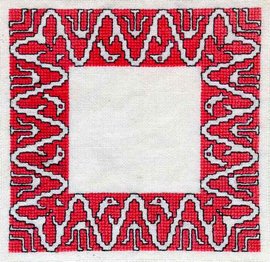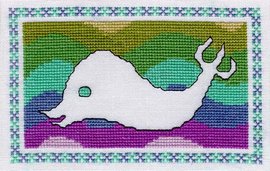Assisi embroidery
|
|
Assisi embroidery is a form of counted-thread embroidery from the Italian town of Assisi, practised since the 13th century and still to this day. It is a negative embroidery, also known as voiding, as the background is filled in while the motif itself is left blank. Cross-stitch is used for the background, usually in the traditional colours (red, blue, green, gold). Blackwork Embroidery, i.e. Holbein stitch is then used to outline the motif and some of the decoration. Traditional motifs were largely heraldic, especially heraldic beasts.
Traditionally, Assisi work was rarely executed in cross-stitch, but most often in long-armed cross-stitch. But examples in other stitches are also known, such as cross-stitch, Italian cross-stitch and Algerian plait stitch.
There are two ways to do Assisi embroidery:
In the oldest pieces, the figures were drawn on the fabric free-hand, surrounded with Holbein stitch and the background was filled as good as possible. For more modern pieces the pattern was constructed carefully on paper, like for usual cross-stich. Today Assisi embroider is always done that way.
In the last 20 years, a modern version of Assisi embroidery has evolved. Many different colours and patterns are used for the background, and the motifs are extremely varied. However, the traditional version is still practised in the town of Assisi where one can see the local women sitting in front of their houses and embroidering Assisi work items for the local cooperative embroidery shop; this is based on the 'Laboratorio Ricreativo Festivo Femminile San Francesco di Assisi', a handicrafts workshop established in 1902 to give employment to poor women to supplement their income.


